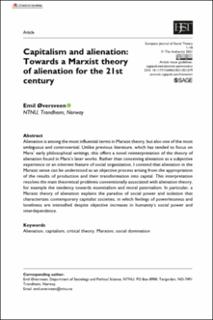Capitalism and alienation: Towards a Marxist theory of alienation for the 21st century
Peer reviewed, Journal article
Published version
Permanent lenke
https://hdl.handle.net/11250/3034904Utgivelsesdato
2021Metadata
Vis full innførselSamlinger
Originalversjon
10.1177/13684310211021579Sammendrag
Alienation is among the most influential terms in Marxist theory, but also one of the most ambiguous and controversial. Unlike previous literature, which has tended to focus on Marx’ early philosophical writings, this offers a novel reinterpretation of the theory of alienation found in Marx’s later works. Rather than conceiving alienation as a subjective experience or an inherent feature of social organization, I contend that alienation in the Marxist sense can be understood as an objective process arising from the appropriation of the results of production and their transformation into capital. This interpretation resolves the main theoretical problems conventionally associated with alienation theory, for example the tendency towards essentialism and moral paternalism. In particular, a Marxist theory of alienation explains the paradox of social power and isolation that characterizes contemporary capitalist societies, in which feelings of powerlessness and loneliness are intensified despite objective increases in humanity’s social power and interdependence.

